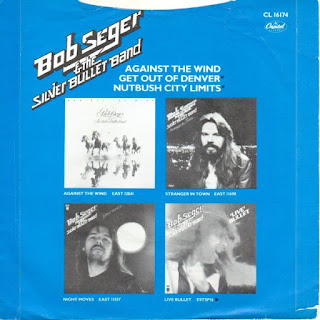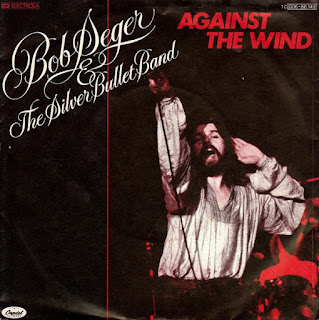BOB SEGER & THE SILVER BULLET BAND - AGAINST THE WIND
Publicada: Abril de 1980
Llistes: EUA: #5
"Against the Wind" és una balada de rock suau escrita i enregistrada per Bob Seger pel seu onzè àlbum d'estudi del mateix nom. Llançada com a segon senzill de l'àlbum l’abril de 1980 per Capitol Records, la cançó es va gravar durant el procés de l’àlbum que va durar dos anys. Produït per Bill Szymczyk als estudis Criteria de North Miami, Florida, el tema compta amb la Silver Bullet Band de Seger i incloïa la veu de fons del co-líder dels Eagles, Glenn Frey. "Against the Wind", caracteritzada pel seu ritme mig tempo i l’acompanyament de piano, es va convertir en un dels senzills més destacats de Seger, arribant al número cinc al Billboard Hot 100 i impactant en les llistes a Canadà, Austràlia i Bèlgica.
Seger va explicar la gènesi de la cançó, afirmant: "El meu vell amic Glenn Frey dels Eagles tenia la idea que el nostre guitarrista Drew Abbott toqués acompanyant el solo de piano. Després ell i jo vam fer les veus de fons junts. Va admetre que va tenir problemes gramaticals amb la frase "Wish I didn't know now what I didn't know then” (Desitjaria no saber ara el que no sabia llavors). Malgrat les seves reserves, els comentaris positius de Frey i d'altres el van portar a mantenir-la. Seger va reflexionar: "Has de comprendre que els compositors no poden puntuar res del que escriuen."
"Against the Wind" explora les dinàmiques subtils entre la cura i la indiferència entre amics i éssers estimats. Amb el seu focus en la maduresa i els records, reminiscent d'altres composicions de Seger, la cançó s’ecpressa en un àmbit gentil i reflexiu. Seger va treure inspiració de les seves experiències com a corredor de fons quan era universitari per crear el títol de la cançó, utilitzant-lo com una metàfora per al viatge cap a l'envelliment.
Seger, deixant la selecció dels singles del disc a Capitol Records, va confiar la decisió al director promocional de la discogràfica, Steve Meyer. La cançó va fer un debut impressionant al Hot 100, entrant al número 54 la setmana que va acabar el 3 de maig de 1980, el que la va marcar com el senzill amb el debut més alt d'aquella setmana. El seu ascens va continuar quan va entrar al top 30 la setmana següent i va arribar al top ten a final del mes. La cançó va arribar finalment al número cinc del Hot 100 el 14 de juny, on va romandre durant tres setmanes consecutives.
Els crítics musicals van elogiar l'habilitat de Seger com a compositor. El crític de Rolling Stone, Dave Marsh, inicialment va criticar les balades a l'àlbum "Against the Wind", incloent la pista titular, afirmant que cap d'elles contenia frases memorables. No obstant, després va canviar la seva opinió, reconeixent la qualitat captivadora de les frases "Well, those drifter's days are past me now/I've so much more to think about/Deadlines and commitments/What to leave in/What to leave out” (Bé, els dies de viatges ja han passat per mi/Ara tinc molt més en què pensar/Plaços i compromisos/Què deixar dins/Què deixar fora). Marsh va destacar com l'expressió dubitativa de Seger va fer aquestes frases no només memorables, sinó també commovedores. Hilburn, del Los Angeles Times, va elogiar l'habilitat de Seger per mostrar l'exploració de la tensió entre l'idealisme que cerca i els reptes que es troben en la persecució d'aquests somnis.
BOB SEGER & THE SILVER BULLET BAND - AGAINST THE WIND
Released: April 1980
Charted: US: #5
"Against the Wind" is a soft rock ballad written and recorded by Bob Seger for his eleventh studio album of the same name. Released as the album's second single in April 1980 by Capitol Records, the song was recorded during a two-year process for the album. Produced by Bill Szymczyk at Criteria Studios in North Miami, Florida, the track features Seger's Silver Bullet Band and includes backing vocals from Eagles co-frontman Glenn Frey. Sonically, "Against the Wind", characterised by its mid-tempo rhythm and piano accompaniment, emerged as one of Seger's standout singles, climbing to number five on the Billboard Hot 100 and making an impact on charts in Canada, Australia, and Belgium.
Seger explained the genesis of the song, stating, "My old friend Glenn Frey of the Eagles had an idea that our guitarist Drew Abbott should play along with the piano solo. He and I then went out and did the background vocals together." He admitted to grappling with the line "Wish I didn't know now what I didn't know then," initially finding fault with its grammar. Despite his reservations, positive feedback from Frey and others led him to retain it. Seger reflected, "You have to understand that songwriters can't punctuate anything they write."
"Against the Wind" delves into the nuanced dynamics between care and indifference among friends and loved ones. With its focus on maturity and memories, reminiscent of other Seger compositions, the song exudes a gentle, reflective ambiance. Seger drew inspiration from his experiences as a high school cross-country runner to craft the song's title, using it as a metaphor for the journey of aging.
Seger, leaving the selection of singles to Capitol Records, entrusted the decision to the label's promotional director, Steve Meyer. The track made an impressive debut on the Hot 100, entering at number 54 in the week ending May 3, 1980, marking it as the highest-debuting single of that week. Its ascent continued as it entered the top 30 the following week and reached the top ten by the end of the month. The song eventually peaked at number five on the Hot 100 on June 14, where it remained for three consecutive weeks.
Music critics lauded Seger's songwriting prowess. Rolling Stone critic Dave Marsh initially criticized the ballads on the "Against the Wind" album, including the title track, stating that none of them contained any memorable lines. However, he later amended his view, acknowledging the haunting quality of the lines "Well, those drifter's days are past me now/I've so much more to think about/Deadlines and commitments/What to leave in/What to leave out." Marsh highlighted how Seger's halting expression of indecisiveness made these lines not only memorable but also poignant. Hilburn from the Los Angeles Times commended Seger's ability to infuse "Against the Wind" with a "timeless, often graceful Everyman edge." He noted the song's exploration of the tension between the idealism Seger seeks and the challenges encountered in pursuing those dreams.












Cap comentari:
Publica un comentari a l'entrada